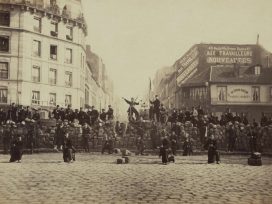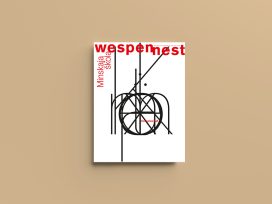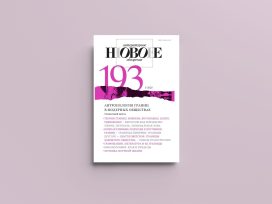Glänta (Sweden) 2–3/2017
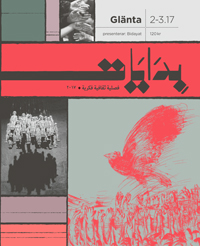
The current issue of Glänta is guest-edited by Lebanese journal Bidayat (‘Beginnings’). Launched in the wake of the 2011 Arab Spring, Bidayat’s strapline – ‘For all seasons of change’ – expresses its undiminished ethos of commitment. As the editors write: ‘More than six years later, in the aftermath of uprisings, revolutions, counter-revolutions, civil wars and reactionary encounters, the endeavour to understand the magnitude and the significance of the historical opportunities that presented themselves continues.’
‘Progressive forces in the Arab World today are caught in a perplexing situation. The challenges are countless: the persistence of despotic regimes, foreign interventions, mass scale destruction and humanitarian disasters, and the forsaking of democracy and social justice in the name of anti-colonialism and anti-imperialism. But, as events are still unfolding, we believe that the future holds surprising openness. The readiness for the coming period of transformations and the possibility of progressive politics will depend vastly on people’s ability to learn from the past, and to understand the present.’ Read the editorial to the issue.
Child marriage: Hind Al-Aryani tells the story of Houria, a 13-year-old Yemeni girl taken from school and forced to marry a man she had never met. Al-Aryani describes the sexual, physical and psychological violence that girls are exposed to when they are forced to marry as children. ‘Blood. A lot of blood. Unbearable pain’ was Houria’s experience on her wedding night. Examining Houria afterwards, the doctor asked her husband angrily: ‘This is almost rape… why all this violence?’
Politics: Sahar Mandour, Bushra Al Maqtari, Rana Zeid and Asmaa El Ghoul on revolutions, uprisings and wars in Egypt, Yemen, Syria and Palestine; and Fawwaz Traboulsi on the history of aerial bombings.
Art and music: Images of Aleppo by Syrian photographer Muzaffar Salman; John Berger on Syrian artist Randa Maddah; Lebanese graffiti artist Ali Rafei; Nawal Traboulsi on Palestinian postal stamps; Ziad Dallal on Arab hip hop.
Re-reading: Iranian revolutionary and sociologist of religion Ali Shariati (1933–1977) on ‘red Shiism’.
More articles from Glänta in Eurozine; Glänta’s website
La Revue nouvelle (Belgium) 7/2017
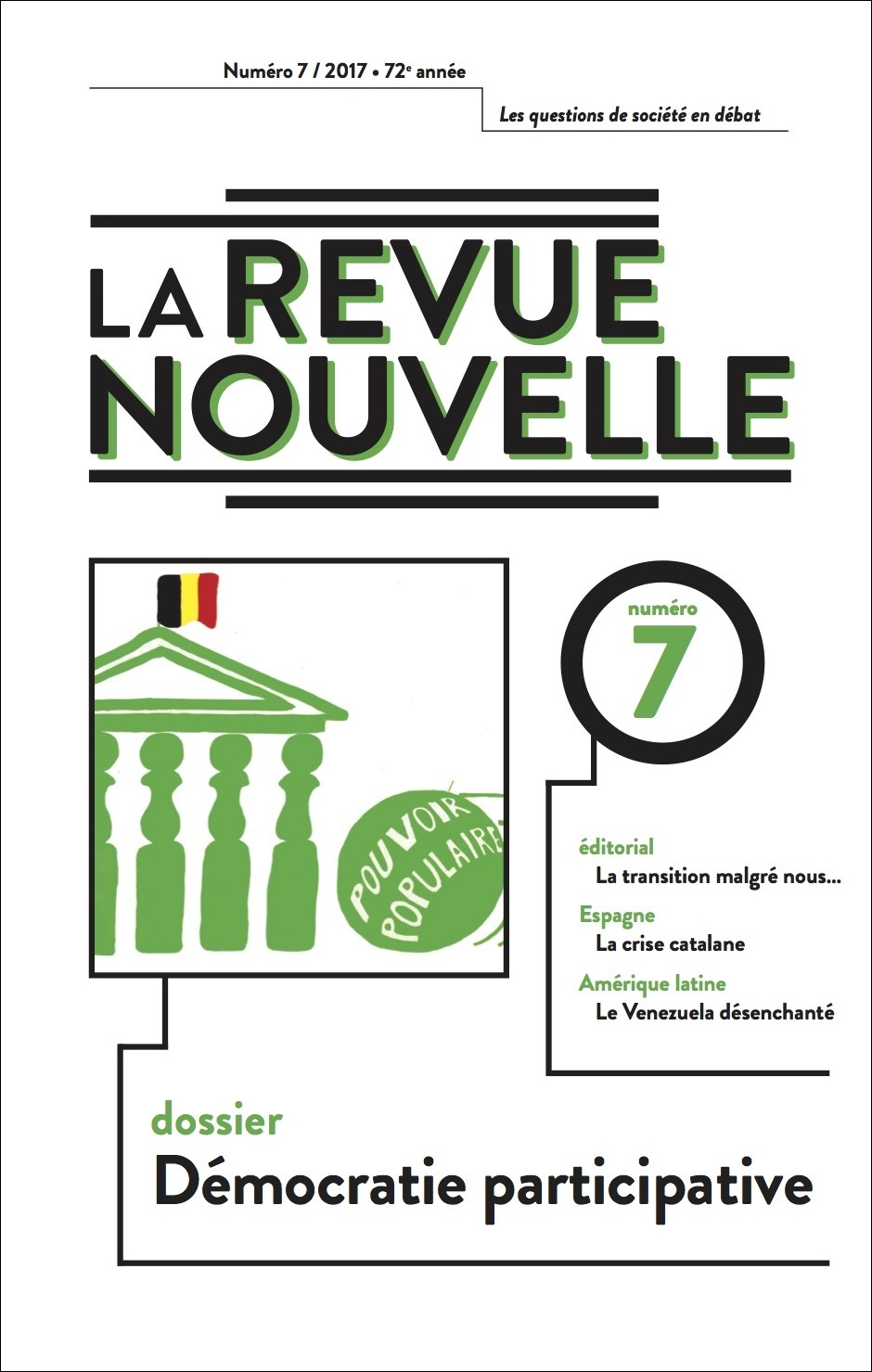
The concept of participatory democracy ought to be a tautology, observe Hervé Pourtois and John Pitseys in La Revue nouvelle, but it does indicate that ‘some conceptions of democracy are more participatory than others’. To be meaningful, participatory democracy needs to go beyond increased turnouts, better communication and more frequent popular consultations. True participatory democracy would involve a more active role of citizens in the deliberative process, the key being John Stuart Mill’s ‘congress of opinions’, involving all citizens, not just elected representatives. ‘Can participatory democracy breathe new life into our existing institutions, or will it end up challenging the very rationale for their existence?’
Alternatives: Electoral consent every five years is no longer sufficient to legitimize institutions, Olivier Petit argues; we need to break with ‘representative dogma’ and establish citizens’ initiatives that would restore confidence in political institutions. Petit looks at the Swiss system of compulsory referendums, at the heart of its canton-based democracy, as well as the French model of the popular initiative, conceived by Condorcet in 1792, which created the very concept of popular sovereignty.
The contrast with Belgium, which has no such recourse to popular initiative in decision-making, is stark. Belgians should be ‘challenging the monopoly of political accountabilities … redistributing them towards the citizenry as a whole’. There is an alternative to resigning ourselves to ‘democratic fatigue syndrome’ – namely establishing a dialogue between people and parliament. Elected representatives, ‘far from seeing their power reduced, would benefit from a new legitimacy by proving closer, more transparent, more responsive to the needs and desires of citizens.’
Catalonia: Marta Garcia Blanco and Carlos Crespo look at ‘the Catalan tragicomedy’, and Guillermo Kozlowski casts a satirical eye over the implications of recent political events for the bitter Barcelona–Madrid rivalry.
More articles from La Revue nouvelle in Eurozine; La Revue nouvelle‘s website
Czas Kultury (Poland) 3/2017
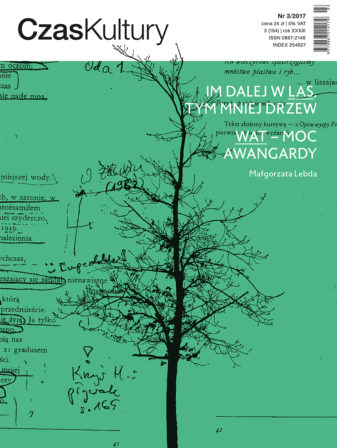
A recent ruling by the European Court could force the Polish government to pay a fine of 100,000 euros per day for illegal logging in the UNESCO-protected Bialowieza Forest. In this context, Czas Kultury presents a hauntingly illustrated collection of articles on deforestation, pitting the short-sighted push for profit against evidence that tree-felling undermines ecologically vital, interacting biological networks.
Trees and memory: A traditional reverence for woodland is doing little to preserve biodiversity. The Polish authorities put up plaques and elaborate scaffolding around dead trees with historical or legendary associations, yet turn a blind eye to broader conservation issues. In a perceptive survey, Agata Agnieszka Konczal suggests that Polish foresters exaggerate the symbolic significance of natural features to firm up perceived links between patriotic myths and their own professional status.
‘Trees aren’t just supposed to grow. They’re expected to teach you how to remember’, she remarks. ‘They help create a version of the past that can be constantly re-enacted and re-invoked.’ Timeless, mythologised accounts of events are drawn into daily life and perpetuated in ways that affect language, culture and behaviour. ‘Anything that happens can fall into the context of this sacralising symbolic structure’, Konczal writes. ‘Within it, history becomes not just a process of narrating the past, but a way of building the world.’
Literature: A dossier on avant-garde writer and poet Alexander Wat, who died fifty years ago. Patryk Szaj makes an intriguing comparison between Wat and Jacques Derrida. Both, he argues, associated the writing process with autobiography and an urge to preserve the multiple, transient voices in themselves. Wat yearned to write an all-encompassing narrative of ‘Everything about Everything’, yet felt it could not be done because any comprehensive work must find shape in a framework that is imagined, not real. ‘To present any kind of cycle of coherent thought you have to be dishonest’, Wat wrote.
More articles from Czas Kultury in Eurozine; Czas Kultury‘s website
Kulturos barai (Lithuania) 11/2017
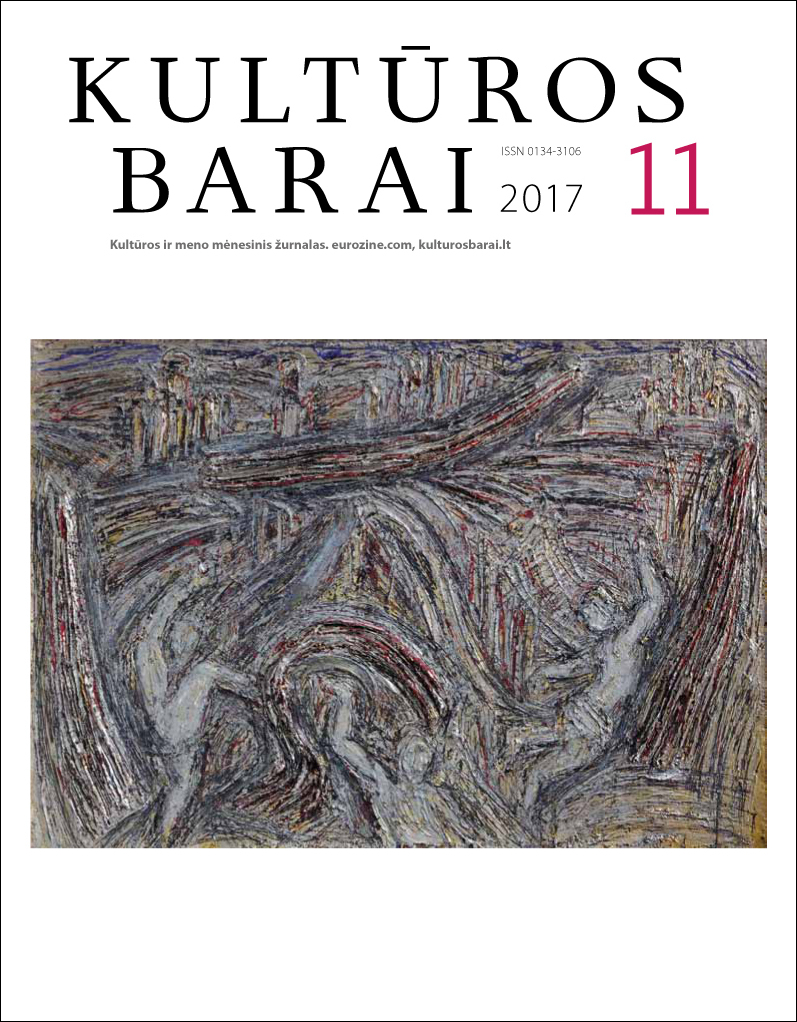
Almantas Samalavicius talks to ecological economist Joshua Farley about the intellectual bankruptcy of mainstream economic science. ‘Math is viewed as the language of nature,’ rues Farley. ‘Charles Darwin would have a hard time getting funded today. Mathematics and quantification have become the gold standard. The closer other disciplines can approach this standard, the greater their prestige.’ Yet, ‘mathematics may be particularly inappropriate for economics and other social sciences.’ Instead, disciplines like psychology, by contributing to the insights of behavioural economics, can offer greater understanding: ‘I believe the likeliest paths for change will not convert mainstream economists, but rather sweep them aside, as chemistry swept aside alchemy.’
1917: Justina Vaičiukynaitė reflects on the centenary of the Russian Revolution and asks how it was possible to enthral so many hearts and minds for them to be prepared to die for an idea. ‘What made them believe that the world can be changed, instead of just trying to explain it?’ In a closely argued piece, Vaičiukynaitė sets out why she believes that studying Marx’s philosophy can help human beings ‘constrained by deterministic relationships, to find answers to complex questions’. However, it is not enough just to focus on the material needs of human beings and ignore the humanistic essence of a person, as Marxism did. She concludes: ‘Marx … like other philosophers, only explained the world, but did not change it in any way.’
Painting: Artist Stasys Eidrigevičius (b. 1949) writes about his recent visit to the Young Painter Prize 2017 show in Vilnius. He slams everything he sees, reserving particular ire for the Estonian prize-winner Alexei Gordin (b. 1989) and his painting ‘Alone in the Studio’. The artist is sitting on a chair, above him there’s a bubble with the words he’s speaking – one presumes ironically: ‘I am a mediocre artist’. Eidrigevičius chooses to take him at his word.
More articles from Kulturos barai in Eurozine; Kulturos barai‘s website
New Literary Observer (Russia) 148 (2017)
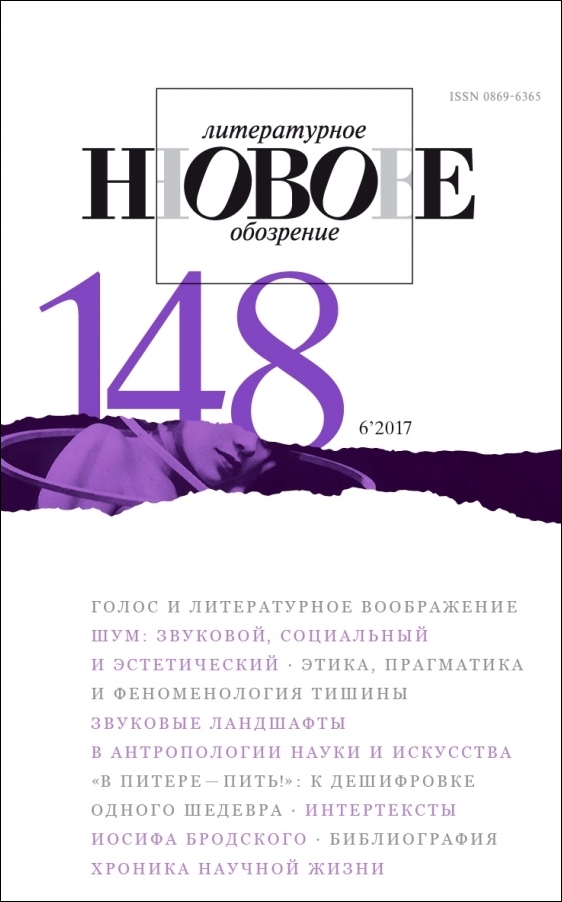
Contributors to NLO (New Literary Observer) explore how sound functions in culture and society. Of central interest is the human voice and its connection to literary creation. According to writer and singer Anatoly Riassov, it is writing and not speech that acts as the ‘guardian of the voice’. In Beckett and Proust, the enunciated word is rooted in silence. The voice, he argues, invokes formless and unstable foundations that precede the division between sense and nonsense.
Noise: Artist and writer Salomé Voegelin discusses noise both as acoustic extreme that attracts attention to the process of communication, and as rhetorical figure that questions cultural conventions and artistic rationalism. Noise is balanced between semiotics and phenomenology: it builds a bridge between the expression of meaning and the process of experiencing it.
Poetry: Sound poetry is a Europe-wide phenomenon, but there are differing opinions about its definition and temporal boundaries. Literary scholar Ekaterina Belavina looks at French sound poets Fred Griot, Vincent Tholomé and Sébastien Lespinasse – three very different artists united by their search for a new language and an interest in early twentieth-century Russian Formalism.
Music: Philosopher Tatiana Weiser listens to Steve Reich’s WTC 9/11, a fifteen-minute composition for string quartet and electronic elements. Analyzing the meaning of the documentary materials used in the work – the voices messages of witnesses to 9/11 – she places Reich’s work in the tradition of defigured art and literature after the major catastrophes of the twentieth century, where ruptures of smooth narrative played a major role.
More articles from New Literary Observer in Eurozine; New Literary Observer’s website
Dziejaslou (Belarus) 90 (2017)
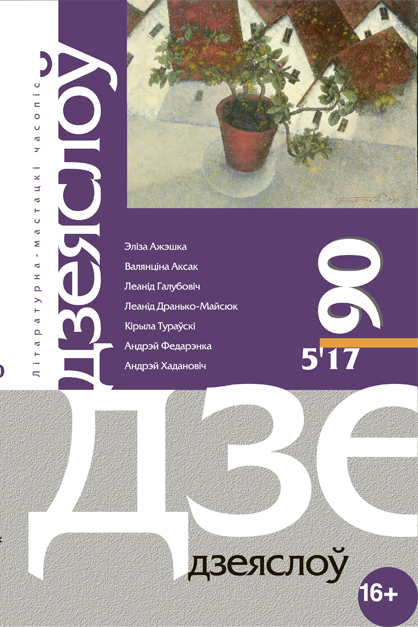
Dzejaslou marks its fifteenth anniversary with an issue covering the spectrum of Belarusian literature. In a section entitled ‘The aura of a talent’, authors and contemporaries commemorate Michas Shavyrkin, the former editor-in-chief of the renowned literary magazine Rodnae Slova (‘The Word of the Mother’), who died last year. Under Shavyrkin’s leadership, the magazine reached a circulation of 10,000; published by the Belarusian Ministry of Education, it educates its readers about Belarusian language, literature and culture.
Ales Belskiy discusses the life and influence of Shavyrkin, whose trademark in later years was his mane of white hair. Belskiy portrays Shavyrkin as being driven by a mission to help Belarusian culture to overcome its history of repression and marginalization. ‘Michas Shavyrkin was deeply convinced … that our national cultural space must be reconnected with the people through the mother-tongue and through authentic, centuries-old folk songs. In Rodnae Slova and the newspaper Zvyazda (‘Star’), he actively popularized Belarusian song culture and Belarusian folk songs.’
Poetry: Jakub Kołas (1882–1956) was a writer and poet with almost unparalleled influence on Belarusian literature. Kołas published Pesni Zhalby (‘Laments’), his first extensive poetic work, in 1910. The cycle tells of the arduous existence of the Belarusian peasantry through the seasons in seventy-four poems of varying length. Pesni Zhalby tends to be interpreted as a ‘collection’, however Anatol Trafimčyk looks at the structure, rhyme and the content of individual poems. What connects them, he argues, is the lyrical first-person that approaches religious, metaphysical and philosophical questions through descriptions of life and nature.
Prose: The writer and activist Uładzimir Niaklajeŭ ran as a presidential candidate in 2010 and was notoriously assaulted and imprisoned on charges of ‘organizing mass riots’. This year, too, he has been forced to spend frequent periods in prison. In a short piece of poetic prose, entitled ‘What is what for?’, Niaklajeŭ muses upon central questions of life and fate. He comments dolefully: ‘Life isn’t rain and it isn’t dust. It isn’t a neighbour either. But what is it, then?’
More articles from Dziejaslou in Eurozine; Dziejaslou’s website
Poeteka (Albania) 46 (2017)

‘Contemporary Balkan literature is nihilistic from beginning to end’ writes Shpëtim Selmani in the new issue of Albanian literary journal Poeteka, lamenting the ravages of nationalism, guilt, and the distressed state of society. Poeteka’s contributors go to great lengths to avoid these local pitfalls. Their stories float free in time and space, with unnamed protagonists of roughly-sketched and ambiguous identity. Imaginative flights of this kind are increasingly common in Albanian writing, as in Rigel Rizaj’s recent fantastical and subhuman novel Amoeba.
Fiction: Ben Andoni’s story Equinox is about an anthropologist’s contact with a tribe in an unidentified continent, and its ritual attempts to propitiate the heavens and deter the punitive expeditions of the ‘black man’ who periodically comes to loot their crops. ‘In fact, they expected him, because their calculations linked him to the time when the stars were in a certain position and God’s day was equal to night.’ Their prophetic shepherd is unable to protect them from a repetitive cycle of destruction.
Eneida Mjeshtri contributes a sequence of stories: a naked girl and woman face each other in a dark room at night, with an owl’s cry an ominous presence. The girl plans to travel for love. ‘I’m glad that I won’t see any more half-people, a half-world. I’m glad there won’t be fences like these that keep us in.’ The woman encourages her, but there is a sense that the girl’s exploit is doomed. And in a conversation for three ungendered voices, a character is told to stand and face judgement, but who is judging them or why remains hidden, in a nightmarish puzzle of guilt.
In Bledar Kurti’s Paramour, a woman shares a bath with her lover, who turns out to be a politician, probably a future Albanian prime minister. He is bent on leaving her, and promises her a comfortable maintenance, but she wants his love. The man must choose, but we are left in doubt as to how this story of power and deceit ends.
Literary history: Poeteka diligently continues its task of recovering the past traditions of Albanian literature that have been mutilated or forgotten, and commemorates Etëhem Haxhiademi, a dramatist and translator of Virgil in the 1930s and ’40s, who was arrested in 1947 and died in prison in 1965.
More articles from Poeteka in Eurozine; Poeteka‘s website
Merkur (Germany) 12/2017
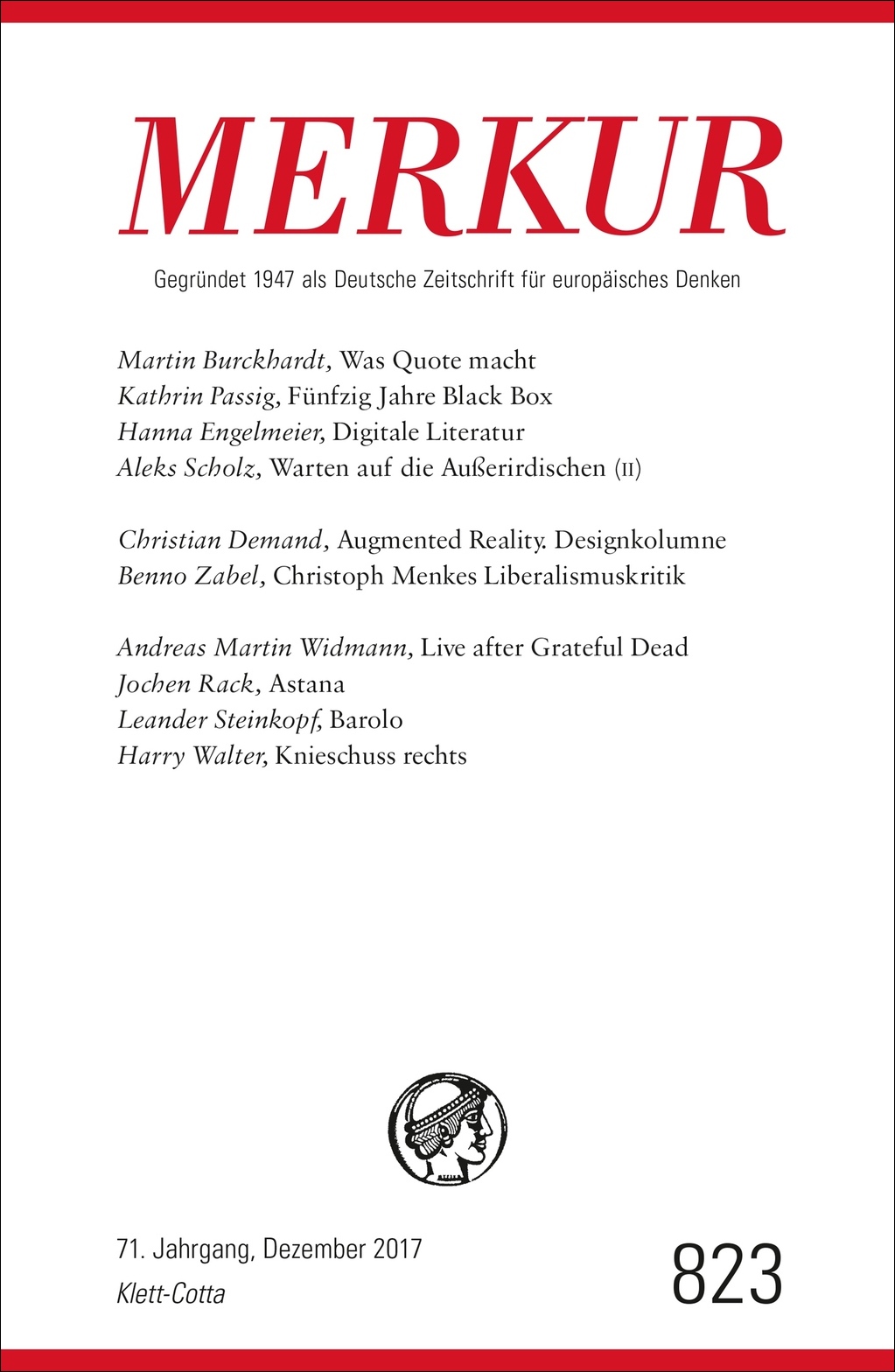
The great leap forward in machine learning – software programmed to make autonomous predictions and decisions – has caused the algorithm to increasingly be seen as ominous ‘black box’, writes Kathrin Passig in Merkur. True, the hyper-complex software systems of today are largely opaque, not only for users but also for programmers; and yet such concerns are as old as software itself: AI pioneers Joseph Weizenbaum (1976) and Marvin Minsky (1967), sci-fi seer Stanislaw Lem (1964), and father of cybernetics Norbert Wiener (1960) all warned of ‘incomprehensible’ machines.
Thanks to procedures for monitoring software output, reliability can be ensured without the content of the black box being fully understood. Indeed, black boxes are everywhere. Citing a molecular geneticist-cum-repairer of iPhones – ‘There is no support from the manufacturers’ side. We have to find out everything ourselves’ – Passig writes: ‘Especially in biology, you don’t get far by demanding more transparent, better documented, more easily comprehensible organisms … The fact that knowledge is still possible is down to a collection of strategies and methods. They are known as science and up to now have proven pretty effective.’
Augmented reality and computer-generated literature: Christian Demand shows why ‘augmented reality’ software and children’s models have the same appeal: ‘both are detached from resistant materiality and the real world’s potential for complication’. And Hannah Engelmeier explains why computer-generated texts like Gregor Weichbrodt’s ‘Dictionary of non-notable artists’ – comprising deleted Wikipedia entries – are of more interest to literary scholars than to readers: because they aren’t meant to actually be read.
More articles from Merkur in Eurozine; Merkur’s website
The Eurozine Review presents a selection of the latest issues of Eurozine partner journals, summarizing their contents in English as a way of encouraging cultural and political dialogue between national public spheres in Europe.

